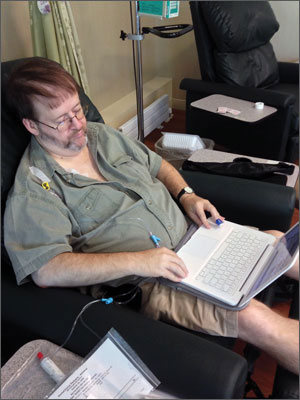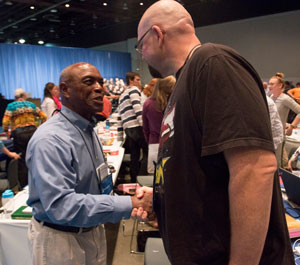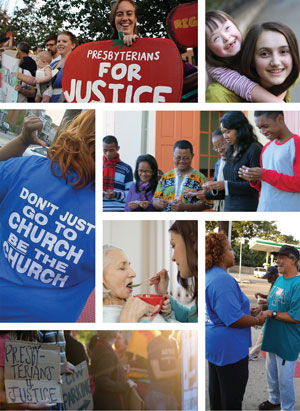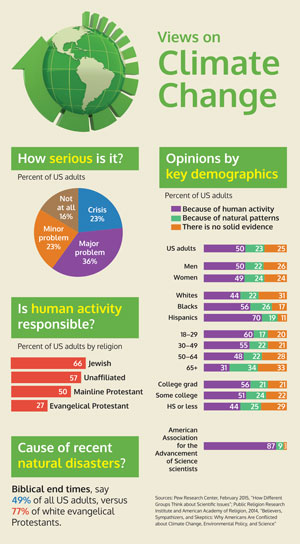Ministries Tags: presbyterians today
2016 Media Kit/Rate Card
Please complete the form below to download the 2016 Presbyterians Today Media Kit.
* Required fields
Continue reading
A Christian take on the Affordable Care Act
Presbyterians navigate a thorny debate to find out how God’s children can best get access to healthcare.
by Chris Herlinger

Charles Freeman juggles seminary and chemo. Without his student insurance, he says, he never would have made the visit to the doctor that resulted in the consultation that resulted in the colonoscopy that revealed his cancer. Freeman, who has since graduated, now has insurance thanks to the Affordable Care Act.
Deborah Wade feigns that she is no expert on the Affordable Care Act (ACA) or the US healthcare system. But within minutes, she is speaking as a savvy, empathetic, and passionate observer of both—their limits, problems, and possibilities.
Before the ACA was enacted, she says, the healthcare system “seemed too often to be a money-making machine for doctors, clinics, and hospitals,” undergirded by costly tests, drugs, and operations. “It was a way to make money rather than a system for helping people improve their health.”
A member of Anchorage Presbyterian Church near Louisville, Wade works as a program coordinator for innovation and community engagement at the University of Louisville School of Dentistry. Before that, she worked as a manager of outpatient HIV/AIDS medical clinics in Alabama and Kentucky, and that gave Wade something close to a front-row seat for some of the last quarter century’s spirited debates on the US healthcare system.
“It’s not perfect, but at least something got done,” Wade said of the ACA, also known, often critically, as Obamacare.
Still, she feels the country is far from achieving what would help provide optimal care—a patient-centered approach.
Continue reading A Providential Coincidence
A Providential Coincidence
Belhar and C67: calls to reconciliation ‘for such a time as this’
By Clifton Kirkpatrick
When the 179th General Assembly (1967) convened almost 50 years ago in Portland, Oregon, society was experiencing a time of tumult and massive social change. The Civil Rights Act and the Voting Rights Act had recently been enacted, with churches—especially black churches—leading the call for racial and social justice. Clearly the Presbyterian Church was called upon to act—and it did in a variety of ways, including giving clear expression to our mandate to work for racial justice in the Confession of 1967.
One of the reasons given for holding our next General Assembly in Portland is the importance of celebrating the 50th anniversary of the adoption of the Confession of 1967 in the city where it was adopted. In the prelude to that General Assembly, an overwhelming number of presbyteries endorsed the confession. Although the confession is almost 50 years old, it continues to capture the imagination of the church. Princeton Theological Seminary and Stony Point Center held commemorations to mark the 15- and 35-year anniversaries, respectively, reminding the church of the confession’s continuing relevance. That will again be a major focus as the Assembly gathers in Portland in 2016.
Continue reading‘And They’ll Know We Are Christian by Our Love’
Being evangelists by being disciples—one young adult pastor’s perspective
by Ginna Bairby

Recently, something very strange has been happening to me. It started in late June, in the days following the conclusion of the 221st General Assembly (2014), and continues to this day: people have been going out of their way to ask me questions about the Presbyterian Church (U.S.A.).
These questions have come from old high school classmates, college friends, even a couple I met at a wedding.
For the most part, these people haven’t been fellow Presbyterians. They haven’t even been friends from other denominations or faith traditions. No, most of these questions are coming from people who either left the church a long time ago or were never a part of organized religion to begin with. These are the notorious “nones,” whose growing numbers have recently garnered considerable media attention.
Continue reading Animal stories
Animal stories
Presbyterians share stories of the animals that have changed their lives.
When Presbyterians Today put out a call for animal stories, we received so many beautiful stories that we decided to publish a number of them online. Click here to view the 10 selected for the print magazine. Below are some of the other most special stories we received.
Continue reading Asked to dance
Asked to dance
When people with disabilities were asked to help lead worship, the results were transformative.
By Sue Montgomery
As the team leader for the General Assembly Disability Consultants, I was asked to lead a workshop for people living with disabilities.
I was more than happy to help. Workshops like these are very much the work of Presbyterians for Disability Concerns, a network of the Presbyterian Health, Education, and Welfare Association that empowers the church to better affirm, support, and advocate for the gifts, rights, and responsibilities of persons with disabilities in the total life of the church.
Continue reading Go Figure
Go Figure
Big benefits in small churches
by Susan Barnett
John Mellencamp’s song “Small Town” describes the benefits of growing up in a place where he knew everyone, was loved, and learned about Jesus. While his song is not about small churches, there are similarities. Small churches celebrate every birth in a big way; everyone is known and loved and learns about Jesus.
Small towns and small churches have another similarity: there are more of them than large cities and large churches. Of the 10,053 PC(USA) congregations, more than 50 percent (5,675) have fewer than 100 members. Among those congregations, the average membership is 45. Fewer than 2 percent of PC(USA) churches have more than 1,000 members. This mirrors the National Congregation Study that found that 59 percent of all churches have fewer than 100 members and that only 2.5 percent have more than 1,000 members.
Continue readingChildren’s sixth sense
New approaches promise to deepen children’s faith and broaden congregational mission.
by Candace C. Hill

Shy and quiet, Vanessa often kept to herself. And for some congregations, that shyness might have meant seeing yet another child slowly drift away from the church—but not Vanessa’s congregation. They were determined to help Vanessa find her ministry.
After hearing the news of the earthquake that killed more than 230,000 people in Haiti, Vanessa was moved. She wondered what she could do to help. So she researched the needs, established a goal, and made a plan. She then asked adults in her congregation how she could involve her faith community.
Continue readingClassified ads
Ad Rates: $12.50 per line (approximately 40 characters). Classified-Display ad: $137.50 per column inch. Deadline: 6 weeks before issue date. Email copy to today@pcusa.org or call 800-728-7228 x5772. Classifieds also appear for two months on the Presbyterians Today website at no additional cost.
MAY/JUNE 2016 CLASSIFIEDS
VICE PRESIDENT, EDUCATION The Board of Pensions of the Presbyterian Church (U.S.A.) is a not-for-profit corporation and one of six national agencies of the General Assembly, the governing body for the PC(USA), which is the largest Presbyterian denomination. The agency administers the church Benefits Plan and Assistance Program, provides …
Continue reading Go Figure
Go Figure
Climate change and religious rifts
by Angie Andriot
Nearly all scientists—87 percent—say the earth is warming because of human activity, according to a study of the Pew Research Center and the American Association for the Advancement of Science. In contrast, only 50 percent of the public believes the same thing. This difference between scientists and the public is well-known.
But did you know that religion shapes our beliefs about climate change?
Although only 6 percent of regular churchgoers say their religious beliefs shape their views on the environment, Christians who hear from their clergy about climate change are more likely to believe that global warming is caused by human activity. Also, beliefs about climate change differ by religion. While 66 percent of Jewish Americans and 57 percent of religiously unaffiliated people believe humans are causing global warming, only 27 percent of evangelical Protestants do. Mainline Protestants reflect the general population, with 50 percent believing that human activity is causing climate change.
Continue reading